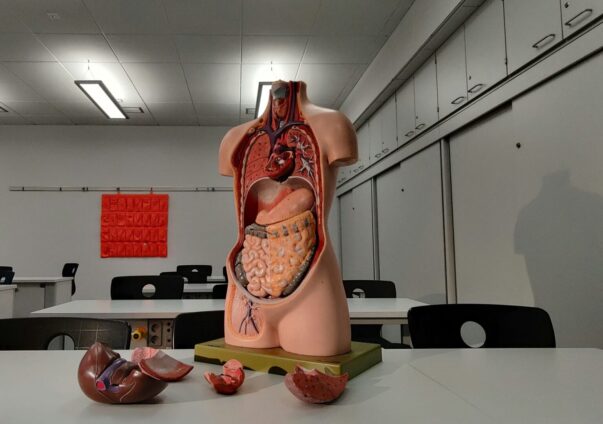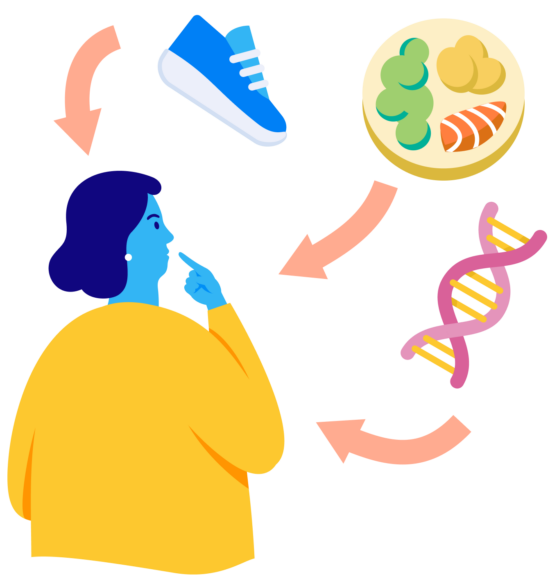
Do any extreme weight loss diets work? (from an expert)
Extreme weight loss methods – like very low-calorie diets (VLCDs) or cutting out whole food groups – may promise fast results but can lead to serious health risks and are usually too hard to maintain, so weight loss is only temporary. Some methods used in medical settings, but only under close supervision and for short periods.
Oviva is a weight management service and NHS provider that supports long-term change. We offer personalised weight loss plans, expert support and, if appropriate, prescription weight loss injections.
Key Takeaways
- Extreme weight loss methods may promise quick results but aren’t sustainable and come with serious health risks.
- These risks include vitamin and mineral deficiencies, excessive muscle loss and mental health risks concerning disordered eating.
- Some rapid weight loss approaches are used in medical settings, but only under strict supervision and for a limited time.
- Focusing on sustainable lifestyle changes – like balanced eating and regular movement – is a more effective path to long-term weight loss.
What are extreme weight loss methods?
Extreme weight loss methods aim to lose weight much faster than the NHS recommends – more than 0.5 to 1 kg (1 to 2 lbs) per week.
They often involve eating far too little, cutting out whole food groups, or following intense workout plans – sometimes all at once.
These methods can feel tempting because they promise quick results, but they’re hard to stick to in real life. And when they stop working, the weight usually comes back.
That can feel frustrating or even like you’ve failed – but it’s not your fault. These plans aren’t designed to be realistic long term.
That’s why we take a different approach at Oviva – one that supports lasting change, not quick fixes.

What are the risks?
As well as being unsustainable, extreme weight loss comes with some serious health risks, including:
- Nutrient deficiencies
- Hormonal imbalances
- Slowing of the metabolism
- Significantly decreased muscle mass
- Loss of bone density
- Damage to organs like the kidneys
- Disordered eating
Some extreme methods are used as medical treatments for obesity, but only in specific situations – like supporting people with pre-diabetes or type 2 diabetes, or preparing for weight loss surgery. In these cases, a very low-calorie diet might be used, but only for a short time and always under close medical supervision.
These are carefully planned medical treatments, not quick diet fixes.
Common extreme weight loss methods (and their risks)
Many popular weight loss methods promise quick results, but some carry serious health risks – especially when used without medical supervision. Here’s what the evidence says.
Very low-calorie diets (VLCDs)
What they are
These diets involve eating 800 calories or less per day, often through meal replacement shakes. They’re designed to create a large calorie deficit and provide nutrients in a controlled way.

What the science says
One study showed people following a VLCD lost an average of 11.3% of their body weight in 12 weeks.
However, research also shows that VLCDs carry a high risk of muscle loss. To help protect muscle, you need enough protein – about 1.2g per kg of body weight. That means someone weighing 100kg would need around 120g of protein per day.
This is why medical supervision and carefully constructed meal replacements are vital.
Medical uses
VLCDs can be used in specific medical situations, such as before weight loss surgery or to help manage type 2 diabetes or pre-diabetes. They should only be followed with medical supervision and usually not for longer than 12 weeks.
Risks
- Muscle mass loss
- Fatigue
- Nutrient deficiencies
- Slowing of the metabolism
- Gallstones

Low-calorie diets (LCDs)
What they are
LCDs provide 1,200–1,500 calories a day for women, and 1,500–1,800 for men. They’re more sustainable than VLCDs and can be followed for a longer period.
What the science says
Short term, VLCDs may lead to faster weight loss than LCDs. One study found that, after a mean of 12.7 weeks, the average weight loss was 16.1% among people on VLCDs and 9.7% for LCDs.
But long-term studies show the difference in total weight loss narrows over time – 6.3% for VLCDs and 5.0% for LCDs across an average of 1.9 years.
This shows that while LCDs are outperformed initially, this ultimately balances out, and weight regain is lower with LCDs.
Medical uses
LCDs are sometimes used under medical supervision for weight management. They’re considered safer and more manageable than VLCDs.
Risks
- Hunger
- Fatigue
- Nutrient deficiencies

Time-restricted eating (TRE)
What it is
Time-restricted eating limits when you can eat – for example, only eating within an 8-hour window each day (known as 16:8 intermittent fasting), or eating normally for five days and limiting calories (to around 500-600) on two (known as 5:2 intermittent fasting).
What the science says
TRE can help reduce calorie intake without strict food rules on what you can eat, instead focusing on when to eat. The periods when you don’t eat reduce your overall calorie intake.
One large-scale review found that intermittent fasting can be beneficial for people living with overweight or obesity, helping to reduce weight, fat and cholesterol.
However, it was found to be less effective than daily calorie restriction for reducing blood pressure.

Medical uses
The NHS generally recommends avoiding unsupervised fasting-based diets. In some cases, TRE may be used under medical advice – for example, to support weight loss before surgery or manage changes during menopause.
Risks
- Hunger
- Energy crashes
- Difficult to sustain
Fad diets and single-food diets
What they are
Fad diets are popular or trending diet plans with little to no scientific backing. Single-food diets typically focus on eating a single food or food group like:
- Juice diets
- The cabbage soup diet
- The carnivore diet
- The grapefruit diet
- The raw paleo diet
What the science says
Fad diets and single-food diets are not supported by scientific evidence. They lack balance and can cause you to miss out on essential nutrients.
These diets also come with a wide range of health risks.

Medical uses
Fad diets and single-food diets are not backed by robust evidence. They’re not approved for medical use, as they’re often unhealthy or dangerous to follow.
Risks
- Nutrient deficiencies
- Muscle loss
- Slowing of the metabolism
- Energy crashes
- Digestive issues
- Difficult to sustain
Ketogenic and ultra-low-carb diets
What they are
The ketogenic diet is a low-carbohydrate, high-fat diet. This and other ultra-low-carb diets generally target less than 50 g of carbohydrates per day.
The aim is to force the body into ‘ketosis’, where your body burns fat for energy instead of burning carbs.

What the science says
Your body usually relies on glucose from carbohydrates as its main energy source. But when you sharply reduce your carb intake:
- Your glucose stores run low
- Your liver starts turning fat into ketones
- You enter ketosis, where fat becomes your primary fuel
Some studies suggest keto can support short-term weight loss and may improve blood glucose levels in certain people.
However, there are important concerns. Research has also linked keto diets to:
- Higher intakes of saturated fat
- Increased LDL (bad) cholesterol, which may raise your risk of heart disease.
Medical uses
The keto diet can be medically prescribed in specific cases – for example, to help manage epilepsy or certain metabolic conditions. It’s also sometimes used under supervision for short-term weight loss.
But it’s not suitable for everyone. The British Heart Foundation does not recommend following a keto diet long term due to limited safety data.
Risks
- Loss of muscle mass
- Concerns about high cholesterol
- Possible risks to heart health
- Difficult to sustain

Extreme exercise regimens
What are they?
Extreme exercise regimens involve excessive exercise in an attempt to burn a large amount of calories. Signs of unhealthy exercise include:
- Exercising to the point of injury
- Exercise that interrupts a normal life balance
- Exercise that causes psychological harm
What the science says
Excessive exercise can cause injuries, psychological harm, cardiovascular issues or bone damage. It can lead to obsessive exercise, which can prevent a healthy life balance.
Medical uses
There are no medical uses for excessive exercise regimens, and you should not use excessive exercise to compensate for a high-calorie intake or other lifestyle factors that affect weight.
Risks
- Injuries
- Heart strain
- Burnout
- Ineffective for weight management
- Unsustainable

Weight loss medications
What they are
Weight loss medications are prescription medications, including GLP-1 agonists, which have proven effectiveness for weight loss and weight management.
What the science says
In one major study, people taking semaglutide (Wegovy) alongside lifestyle support lost an average of 14.9% of their body weight in 68 weeks – compared to just 2.4% in the placebo group.
All participants received weekly injections and guidance on healthy eating and exercise – showing that medication, when combined with behavioural changes, can significantly enhance weight loss results.
Medical uses
These medications are only approved for people with a clinical need to lose weight, usually defined as:
- BMI over 35, or
- BMI over 32.5 if you’re from a Black African, African Caribbean or South Asian ethnic background,
- Plus a weight-related health condition (e.g., type 2 diabetes, sleep apnoea, hypertension)
The injections should only be taken under medical supervision to ensure you’re taking safe medication, and so that dosages and side effects can be effectively managed.
Risks
Buying Wegovy online comes with serious risks to your health.
The market is now flooded with medications that are not what’s advertised and may include incorrect dosage information or toxic ingredients.
Buying the medications or using them without a prescription and medical supervision can be extremely dangerous.

The hidden dangers of extreme dieting
Extreme weight loss methods can lead to hidden dangers that make them unhealthy, less safe and less sustainable than gradual weight loss approaches.
Muscle loss
Rapid weight loss can mean losing more than just fat – it can also lead to muscle breakdown, especially if you’re not getting enough protein.
When weight loss is too fast, a larger percentage of what you lose may be muscle, not fat.
Slowing of the metabolism
Your body may also respond to rapid weight loss by slowing your metabolism.
This could lead to weight loss plateaus and make weight loss harder as you go.
That’s why the best tips for weight loss focus on a slower, more steady approach, which is less likely to lead to weight regain.
Nutrient deficiencies
Cutting calories too severely – or restricting whole food groups – can cause gaps in essential nutrients like iron, calcium and B vitamins. This can lead to symptoms like:
- Fatigue
- Loss of bone density
- Joint pain
- Shortness of breath
- Ticks and seizures (in severe cases)

Impact on mental wellbeing
Extreme weight loss methods don’t just affect your body – they can impact your mental health too.
Very low-calorie diets and other extreme approaches can:
- Increase the risk of disordered eating behaviours, like binge eating or emotional eating
- Raise anxiety around food, weight, and eating habits, like food noise
- Make it harder to build a healthy, sustainable relationship with food
Because these methods are so hard to maintain, they often lead to feelings of failure – even though the real problem is the diet itself, not you.
Are extreme weight loss methods ever recommended?
Sometimes, healthcare professionals may recommend more intensive weight loss methods – but only when there’s a clear medical need and careful supervision.
For example:
- Low-calorie or very low-calorie diets (VLCDs) may be used to prepare someone for bariatric surgery or to help put type 2 diabetes into remission.
If used, these approaches are:
- Strictly time-limited (guidelines recommend no more than 12 weeks)
- Always paired with follow-up support to help prevent weight regain and build healthy habits afterwards
They are not suitable for:
- Children or teenagers
- Pregnant women
- Older adults
- Anyone with a history of disordered eating

A safer, more effective way to lose weight – with lasting results
Extreme diets can be risky – and the results rarely stick. If you’re looking for something sustainable, Oviva could help.
Our NHS-funded programme combines:
- Personalised coaching from dietitians, doctors and behavioural experts
- Sustainable nutrition guidance – no cutting out whole food groups
- Access to prescription weight loss medication, if appropriate
- Easy progress tracking in the Oviva app
Together, these tools can help you build healthier habits, feel in control, and lose weight in a way that works for your body – and your life.



